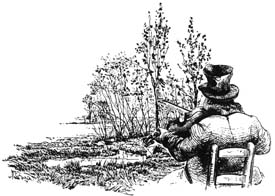|
|
|
|
. |
As an ex-school teacher (21 years), I especially enjoyed the article, "Summer Schools and Teachers' Exams" which appeared in the June, 1990 issue. My great-grandmother attended a similar "teachers' institute" in Missouri and rode a bicycle off into Oklahoma Territory to teach at an Indian mission school in the late 1800s. I don't think she went for more than about 8-10 weeks to earn her certificate. Sometimes I wonder if the students weren't better off then than now. We were down in your part of the country in early June. We rode at Bear Branch for five days with "Snooks" and Merle Nutter. We envy you people having such beauty in your backyards. Do all you can to keep it that way. If the timber cutters ever really start going, they could really ruin the area in a hurry. Keep up the good work with Springhouse. It is a voice for a forgotten part of Illinois.
Dear Judy and Gary Your Springhouse gets better and better with each issue. Keep it up! And keep me on your subscription list.
Dear Mr. DeNeal Enclosed find check for renewal subscription to Springhouse. Would not want to do without it. Also, I would like to add a bit to the "poor farm" narrative, as told by my good friend, Ed Shuster, in the February, 1990 issue of Springhouse. Back in the early 1900s, my father, Sam Mead, was in the furniture and undertaking business, with his father-in-law, Tom Jones. They had a contract, for a number of years, with the Poor Farm management, to bury deceased indigents. They provided the casket and a wooden box, transported the body to the cemetery of choice, arranged for any requested services, then proceeded with burial. All this was done for the total sum of $9.95 for each service.
Every now and then Darcy O'Brien forwards to Springhouse letters from readers of his book Murder in Little Egypt. Thanks, Darcy. Dear Mr. O'Brien I have just finished reading your book, Murder In Little Egypt, and I want to thank you for writing it. I first learned of the book when the ex-Mrs. Cavaness appeared on an afternoon TV talk show. I knew right away that I had to read the book, because both my husband and I are "Egyptians. " We had enjoyed reading Bloody Williamson and A Nickel's Worth of Skim Milk some years ago. We grew up in Perry County, Pinckneyville to be precise, and are at least 4th generation "Egyptians" even though Pinckneyville is on the northern end of "Egypt." (I, however, was born in Christopher, more in the heart of 'Egypt.") We moved to California as soon as Don graduated from SIU, and at that time we did not realize the uniqueness of our heritage. We would tell others of our small town life, and always our stories would be outlandish to the listeners-not at all like their memories of small town America. We had to be away from Egypt and read about it before we understood why our friends found our memories so interesting. Thank you for the hours of research necessary to make this book so good. Of special interest is your comprehensive first chapter. I just finished recording it so that my 96 year old "Egyptian" aunt can enjoy the history. During the mid 20's my mother and father lived in Williamson County and in Jackson County, where you can be sure my Oklahoma born father's half-breed blood line was never mentioned. Shortly after my birth in 1928, my parents had to take me to Benton (I think) to a doctor (I was "born poorly"). Mother told me often how they waited and waited for the doctor to get to his office. When he did arrive very late for the appointment, he apologized for being tardy. He had been detained by the Birger hanging where he had been the officiating doctor. Don and I have lived in California since 1952; now that he is retired we spend most of our time where we are now, in Ensenada, Mexico. But in spite of the fact that we do not choose to live in So. Illinois, it remains a vital part of us; we still refer to it as "back home. " We took my mother's ashes back to Pinckneyville, just as eventually we'll take my aunt's body. We have a few relatives back home and have "stopped by" seven times and are preparing to leave next month for the East, with a stop in Pinckneyville. Somehow, we managed to grow up without the bigotry which is so open, so accepted. We cringe as the home folks begin their ethnic jokes, usually with a disclaimer, "Now I know you two might not like this but it is funny!" Again, thanks for a well researched, very readable book that captures more than just the doctor but the very fiber of our roots.
Dear Editor (well, sort of anyway) Just thought I'd knock off a few lines to let your readers know what I've been up to lately. I'm now a lexicographer, you know, one who compiles a dictionary allegedly for the improvement and edification of mankind, but more for his own entertainment. Actually, I've gone the regular lexicographers one better by inventing my own words, two of which I now share with Springhouse readers wherever they may roam. Now who but a dolt would use the word poverty when my word poorverity is several times more apt? Take pov, for instance. It means nothing, never has, never will; it's just there. Poor, by contrast, not only means something but keeps the meaning going down the years. Poor as in nose pressed against the window glass while rich folks talk stock market between bites of lobster. Poor as in old age without friends, aspirations or health benefits. Poor as in staring into a cracked mirror and seeing fear, also known as blinding, up-from-the-gut terror. Costarring is the raw-as-a-bad-day-in-January, hollowed-out feeling that rarely repacks after setting up housekeeping in a ferow's soul. An endless rerun of a tragedy played in a mirror beyond repair -that's what poor is. Verity means truth, and the truth of the matter is-I know, believe me I know-poor IS truth for too many people these days. Simple logic demands right-thinking individuals everywhere scrap the wom-out poverty and step up to a real word, my word, poorverity. Yes, poorverity is truly the word of the 1990s, even though it was coined last Thursday afternoon at the end of rutted dirt road somewhere deep in the Shawnee Hills. On a more cheerful note let us turn to Chicago, you know, that big town north of Illinois where the winds off Lake Michigan are soulful as sledge hammers and everybody seems in a hurry, just why I don't know. Now I've never been a fan of Chicago, being country born and proud of it; still, what kind of name is Chicago for a town of such size and energy? Wouldn't my Chugcargo fit the bill much better? Chugcargo: can't you just hear a freight train on a steel blue moming-huffa chuffa, huffa chuffa, woooo, wooo-pulling out for Omaha, or St. Paul, or even Rockford? Meanwhile, back at the Loop, skyscrapers pierce the morning fog to dazzle pilots and sea gurs, while far below sidewalks teem with pedestrians hurrying off to work. Compared to my Chugcargo the name Chicago is a grandmotherly breeze brought shoulder to sideburns with a tornado. Besides, Effen Wynne told me one time Chicago was an Indian name for some wild onions growing next to Lake Michigan, only it wasn't Lake Michigan then, just Big Water. I tell you straight out, Poorverity and Chugcargo are good enough to go in anybody's dictionary. And if you think they're something, wait till you see the word magic your correspondent has conjured up to improve Nebraska, Ohio and Delaware
Dear Judy and Gary Enjoy your magazine as usual! My friend and fellow member of The St. Augustine Genealogical Society, Doris Koster, has been reading my copies and she and her husband love them even though they are not from the area. She may have ordered her own by now. I think she ordered some of your books. She is one of my reporters on The Ancient City Genealogist, which I edit. Very small quarterly but a lot of work! I have been busy with it and my Old West Ledford book as well as other writings but sooner or later may send you another article. I really enjoy Mr. Stroble's articles. The humor always comes through! Please send a subscription to my daughter, Kathryn Heaton as enclosed and send me a copy of the book I have listed.
Obituary Alvin H. Roberts This day is one I will not forget. September 20, 1989 is the day on which I said goodbye to a friend of more than thirty summers. I will never forget the comfort and pleasure derived from this association. I was assisted in keeping a cool head during hot summer days when everything seemed to go wrong; my nights were made soothing and relaxing, permitting restful sleep which revitalized my body and spirit sufficiently to face the next sweltering day with equanimity; and, as I resided in a house populated by cigarette smokers, I often appreciated the refreshing atmosphere in the company of my non-smoking friend. The reader may have surmised by this point that my departed friend was an electric fan. During the 32 years I owned this fan I have had two wives, two daughters, four sons-in-law and four grandchildren. The fan has kept all of us cool on many summer evenings during the thirty years since buying the house at 402 East College in Carbondale. Our family has often discussed the long and continuous service rendered by the old fan. Like most aging people and machines, the fan began to require increasing maintenance during recent years. For the past several springs, when I would bring the fan up from the basement, its blade would not turn until it had been taken to Hershel Howell of Murphysboro for a checkup and tune-up. Each year, Cathy, my wife, would suggest that we purchase a new, light-weight fan, one quiet enough to permit normal conversation in the dining room where the old fan is mounted in the window. Each time I would defer this decision to the next year, saying I just wanted to see if my old friend would make it through one more season. The end came today just before breakfast. The fan blade began to slow and finally came to a complete stop. Cathy insisted that I put it out of its misery by pulling its plug before it burned down the house. I solemnly removed my heavy, thirty-year old fan from the window, softly tied its electric cord around the handle, dropped a plastic bag over the quiet frame, slowly carried my old friend to the back yard and lowered it into the dumpster. We are heading for the mall to purchase a new, quiet window fan, but the old one will not be forgotten. If this new fan lasts as long as the old one, I will probably not be around to pull its plug for the last time.
Letter to the Editor It's not just a good idea, it's the law. Anyone living in a licensed nursing home in Illinois is entitled to rights as a citizen of the United States and as a citizen of the State of Illinois, especially if there is no court appointed legal guardian. (Illinois Citizens for Better Care.) Nursing home residents have the right to communication with others which is not hindered. Mail, phone calls, and visitations must be without censorship. Nursing home residents have the right of personal choice to manage their own finances, personal effects, attire, freedom of religion, etc.Nursing home residents have the right to privacy. If a spouse lives in the same nursing home, a shared room together is allowed. Guests and staff must knock on the door before entering the room of a resident. Nursing home residents have the right not to be abused or neglected. If a resident is abused, nursing homes and their staff have an obligation to stop it and report it. Loss of one's job because of threats from a supervisor or administrator should not interfere with the law! Nursing home residents, and all older adults for that matter, have a right to be listened to and to be believed. Growing older does not mean one is senile or has delusions. In dealing with older adults it is imperative not to classify each bit of idiosyncratic behavior as senility. Senility is an inaccurate, misunderstood, misused term and has been responsible for much unfair stereotyping of behaviors of the aged. For example, if a 45 year old person forgets a telephone number, that's acceptable. But if the same memory loss appears at age 75, it is suspect and likely to be interpreted as impending senility. Senility is not and never has been an inevitable part of growing old. Putting the problems of old age into perspective as problems of individuals with varied personalities, different past experiences, and unique biological systems instead of writing them off as the inevitabilities of old age is certainly a step in the right direction. Senility is an organic brain disease, memory loss is not. Many young people have difficulty remembering even the slightest details, but that same person as he or she grows older suddenly is viewed as " old and senile" regardless that his or her memory loss is not a new phenomena with growing older. Just because a person grows older or lives in a nursing home does not mean he or she loses his or her rights. Rights of older people are protected by law just as is everyone's rights. Growing older does not go hand in hand with diminishing rights as a citizen. Older people have the right to be heard and believed by their family, their friends, their neighbors, by nursing home staff, in our courtrooms, or by anyone else with whom an older person communicates. The loss of one's rights and the stereotyping of old age with senility have no place in a "kindlier and gentler" America.
|
|
|
|




